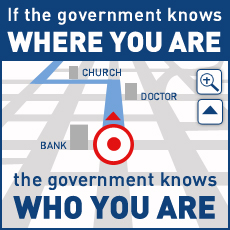Tracked: The Supreme Court Shouldn't Let Technology Trump the Constitution


Yesterday we filed a friend-of-the-court brief in United States v. Jones, which at The New York Times called "the most important Fourth Amendment case in a decade." We are asking the Supreme Court to hold that the government needs to establish probable cause and obtain a warrant before attaching a GPS device to a person's car and tracking their every move.
This case is one of the first in which the Supreme Court will grapple with the profound impact of new technologies on the privacy that Americans have always enjoyed and expected. It could shape whether the Fourth Amendment's protections from warrantless searches keep pace with new technologies, preserving our civil liberties into the 21st Century.
Our brief explains why it is important that the Court conclude that the Fourth Amendment protects us from warrantless GPS tracking:
GPS technology provides law enforcement agents with a powerful and inexpensive method of tracking individuals over an extensive period of time and an unlimited expanse of space as they traverse public and private areas. Unless this Court concludes that GPS tracking is a Fourth Amendment search, any individual's movements could be subject to remote monitoring, and permanent recording, at the sole and unfettered discretion of any police officer. Without judicial oversight, the police could track unlimited numbers of people for days, weeks, or months at a time. Americans could never be confident that they were free from round-the-clock surveillance of their activities. With a network of satellites constantly feeding data to a remote computer, police could, at any instant, determine an individual's current or past movements and the times and locations that he or she crossed paths with other GPS-tracked persons.
Although the Jones case involves attaching a GPS device to a car, its impact could stretch far beyond this specific circumstance. GPS devices are only one of numerous new technologies capable of exposing private facts about individuals who have done nothing more than set foot outside of their homes. The cost of being out of doors should not include being targeted by a battery of technologies that possess surveillance capabilities far exceeding those of the unaided five senses.
Today people carry their cell phones with them wherever they go, in private as well as public spaces. There are now more than 302 million active cell phone subscriber accounts in the United States. The latest statistics indicate that 26.6% of households no longer even maintain a landline. The government's proposed rule would effectively turn each of these cell phones into an instrument of state surveillance to be activated at the unsupervised whim of any law enforcement officer.
Last week the └¤░─├┼┐¬¢▒¢ß╣¹ released to the public an extremely important Justice Department document explaining for the first time how long cell phone companies keep records on our movements. It should not have taken a public record request to the government to find out such a basic and important fact about how cell phones monitor hundreds of millions of Americans. It certainly should not have taken until 2011 ÔÇö many years after most of us acquired our first Nokia brick phones ÔÇö for the public to be informed about the way our personal information is stored and ultimately handed over to the government.
Now that we've forced disclosure of the Justice Department document, it is clear that all cell phone companies keep records of where we have been for a least a year and, if you use AT&T, it has recorded your location back to July 2008, with no indication that it ever purges location records from its system. The hundreds of millions of Americans who use cell phones deserve to rest assured that the government will not convert these cell phones into tracking devices without demonstrating probable cause and obtaining a warrant.
Join us in demanding , because we shouldn't have to choose between civil liberties and using technologies so commonplace that it would be difficult to live in society without them.
Learn more about location tracking: Sign up for breaking news alerts, , and .

